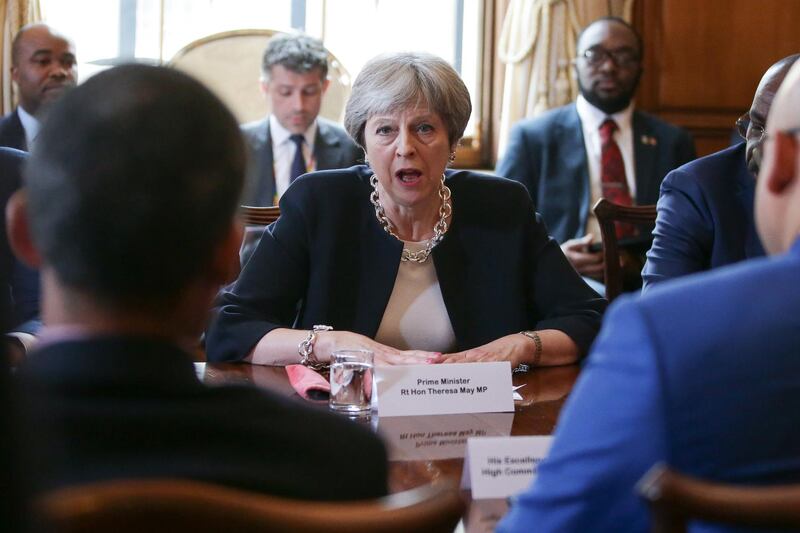The Windrush scandal has raised concerns over whether EU citizens will face similar issues in the UK after Brexit.
The “Windrush generation”, whose parents were invited to Britain from the Caribbean after the Second World War, have been caught up in a tightening of immigration rules overseen by British Prime Minister Theresa May when she was Home Secretary.
Guy Verhofstadt, the European Parliament’s Brexit negotiator, said on Wednesday that he would be seeking “full guarantees” for EU nationals during talks with the UK’s Home Office next week.
“We must avoid a post-Brexit bureaucratic nightmare for EU citizens,” Mr Verhodstadt tweeted.” We need full guarantees in the light of the #Windrush scandal. The EP will discuss this with the Home Office in Brussels on Tuesday 24 April.”
It also emerged on Wednesday that landing cards, which were filled out by Commonwealth migrants and were used to establish the date when they had arrived in Britain, had been destroyed by the Home Office.
Children of migrants who began moving to the UK with the Empire Windrush ship in 1948 had travelled on their parent’s passports and so the cards were a significant form of documentation.
However, the cards, which were being stored in Croydon, south London, were disposed of to comply with data protection rules in 2010.
Labour politician David Lammy described the treatment of the Windrush generation as a national disgrace during an impassioned speech in the House of Commons on Tuesday.
“The Home Office’s excuse is that they destroyed Windrush records because of data protection. That is a disgrace and an insult to thousands of people,” Mr Lammy tweeted on Wednesday. “They destroyed the records and now you are destroying lives. I fail to understand why a Minister has not resigned. Shameful.”
The Home Office’s excuse is that they destroyed Windrush records because of data protection. That is a disgrace and an insult to thousands of people. They destroyed the records and now you are destroying lives. I fail to understand why a Minister has not resigned. Shameful. https://t.co/YatpH6MUj1
— David Lammy (@DavidLammy) April 18, 2018
The Home Office said the cards were not definitive proof of continuous residence in the UK.
Changes to immigration rules in 2012 were designed to create a “hostile environment” for illegal immigrants by making it almost impossible for people without papers to remain.
_______________
Read more:
[ UK’s May apologises over treatment of ‘Windrush’ migrants ]
[ Britain climbs down in row over Windrush migrants ]
[ ‘Windrush generation’ row deepens as May rules out summit ]
_______________
This has resulted in first generation migrants being told they need evidence to continue working, living and accessing health services in Britain.
Migrants who have spent their whole working lives in the UK, having arrived 50 or 60 years ago, are facing uncertainty over their status.
As many as 50,000 people are believed to be having difficulties in accessing key services and it is believed some have even been erroneously deported.
Gaston Browne, the Prime Minister of Antigua and Barbuda, said he knew of one Antiguan who had been identified for deportation for having no original documents.
"He came here about 59 years ago as an infant with his parents, and would have been on his parents' passport,” Mr Browne told Sky News.
"Many of these individuals do not have any connection with the country of their birth, would have lived in the UK their entire lives and worked very hard towards the advancement of the UK."
Junior Green, who arrived in the UK in 1958, was turned away from a plane when he attempted to return to England after caring for his dying mother in Jamaica.
Mr Green, 60, had his application for a visa denied by the Home Office after being asked to provide proof of residency for every 10 years he had been in the UK.
The father-of-six, who describes himself as an "Englishman", had a letter giving him indefinite leave to remain but was not allowed to add this letter to his Jamaican passport.
Junior Green was not allowed to return to the UK for his mother’s funeral even though he has lived in the UK for 60 years, his sister tells @JamesClayton5 the family “couldn't believe it” #newsnight pic.twitter.com/wXZ4VMqVzF
— BBC Newsnight (@BBCNewsnight) April 17, 2018
However, he said he had to go to Jamaica to see his mother one last time, despite the issues with his visa.
"It was very bad actually, if I didn't go, I probably wouldn't see her alive again,” Mr Green told the BBC’s Newsnight programme. “That's a choice I had to make...so I went. I had all evidence showing I lived in the country, so I thought I had no problem."
As a result, Mr Green was stuck in Jamaica for months before he was allowed home. His mother’s body had been repatriated to the UK and he missed her funeral.
Mrs May apologised to Caribbean leaders on Tuesday while the Home Office announced a helpline had been set up to investigate Windrush migrants’ cases.







